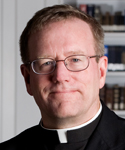October 25, 2009
Protestant-Catholic debate, sticky question still there

Faith
and Culture
These past several weeks, I’ve had to take a number of plane trips, and this meant I’ve had a fair amount of time for reading. I managed to get through a lengthy book that I had been eager to read: “Christianity’s Dangerous Idea: The Protestant Revolution” by Alister McGrath.
McGrath is a professor of theology at Oxford University and one of the most prolific authors on the religious scene today. His latest book is a very readable exploration of the history of the Protestant movement from its origins in the 16th century to the present day, as well as a study of the major themes of Protestant thought and practice.
In the course of his text, we find rich discussions of Martin Luther’s master idea of justification by grace through faith, and of John Calvin’s doctrine of double predestination, and of the general Protestant option for the primacy of the Word of God. But the issue to which McGrath returns again and again, almost obsessively, is that of authority. Who, for Protestants, finally has the authority to offer the correct interpretation of the Bible?
The problem arose, of course, from Luther’s insistence on the priesthood of all believers and the right, therefore, of every believer to interpret the Bible according to his or her lights. The reformer objected to what he took to be the sequestration of the Scriptures by a small elite of ecclesiastical interpreters who doled out the Word of God in tiny and questionable portions to the common people.
He trusted that every believer could understand the plain sense of the Bible without the ministrations of the church and its “official” readings. Now what became glaringly obvious, even within Luther’s lifetime, was that things were a bit more complicated.
Within a few years of the launching of the reformation, wildly divergent interpretations emerged within Protestantism, regarding sacramental practice, liturgy, the Eucharist, church government, the relation between church and state, etc. And within a few decades of the founding, numerous major and contesting branches of Protestantism arose: Lutheranism, Calvinism, Anabaptism, Pietism and Anglicanism.
Clearly, the “plain” sense wasn’t so plain after all. Though the various denominations tried to rein things in by crafting official creedal statements, the divisiveness continued and deepened, since a resistance to centralized authority was written into the DNA of the Protestant movement. (We can see the very same dynamic on display today in the wars over sex and authority currently ripping apart the Anglican church).
What’s interesting is that McGrath acknowledges all of this and admits that, in light of Jesus’ great prayer that his followers may be one, the divisiveness of Protestantism is problematic. But he is satisfied that a general consensus, emerging from the leading preachers and theologians and congregations of the Protestant movement, suffices for the establishment of a workable unity. Here, he argues, the Protestant sensibility is quite similar to the democratic sensibility: no absolute authority, but a gradually arrived at consensus.
I’ll admit that as I followed McGrath’s argument, and even admired the dexterity of it, my Catholic mind kept balking. The question of authority, it seems to me, cannot be permanently bracketed or postponed through appeals to a vague consensus.
Let’s face it, when there are more than 30,000 Protestant denominations in the world, what kind of meaningful consensus is there? And if we were to pursue Mc- Grath’s political analogy, would anyone think that a polity consisting of 30,000 separate parties would ever be functional?
In the 19th century, John Henry Newman, who was raised in a Calvinistically tinged Anglicanism and became a Catholic at midlife, wrestled mightily with this same question. Like McGrath, he acknowledged that there is a legitimate role played in the life of the church by theologians and preachers and the ordinary faithful. In fact, he famously suggested that at times the sensus fidelium is the most authentic carrier of the church’s orthodox faith.
He furthermore held that ecclesial authorities can at their worst descend into tyranny. However (and this is the decisive point), Newman felt that, at the end of the day, after all of the conversations have played out, after all of the arguments and counterarguments have been made, there must be a living voice that can declare, decide and determine. And this voice he recognized as that of the Catholic magisterium, the pope and bishops teaching together on matters of faith and morals.
Anyone who is really serious about a sport welcomes the umpire or the referee. A baseball game without an umpire devolves in short order into chaos, as both teams bicker about balls and strikes or whether a hit was fair or foul. A basketball game without the living voice (and shrill whistle) of the referee quickly collapses, as the players spend more time arguing than playing.
Christianity is something like a game, marked by vitality, novelty, the interplay of freedoms, and sheer exuberance. What Newman saw so clearly was that it was precisely the authority of the church that preserved the unity of the Christian game and hence the fun of it.
McGrath’s compelling book has helped me to see that this issue of authority, which was the subject of the earliest debates between Luther and his opponents, is still the question today in Protestant/Catholic discussions.
Barron is the Francis Cardinal George Professor of Faith and Culture at the University of St. Mary of the Lake/Mundelein Seminary. For more of his writings visit www.wordonfire.org.
 Catholic
New World - Newspaper for the Archdiocese of Chicago
Catholic
New World - Newspaper for the Archdiocese of Chicago Archdiocese of Chicago Directory
Archdiocese of Chicago Directory Oficjalne wydawnictwo Archidiecezji Chicago w języku polskim
Oficjalne wydawnictwo Archidiecezji Chicago w języku polskim